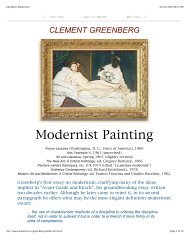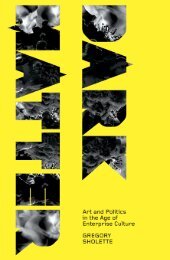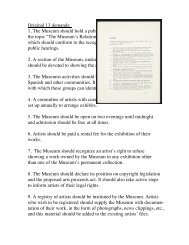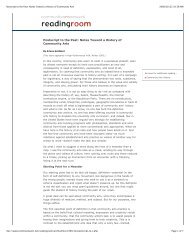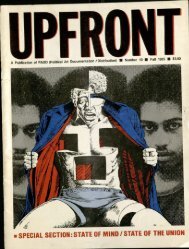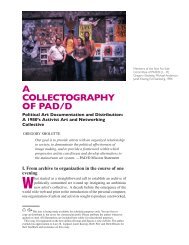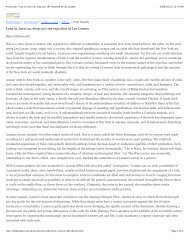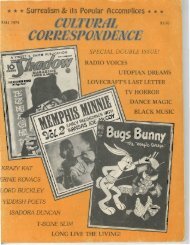The New Spirit of Capitalism - Dark Matter Archives
The New Spirit of Capitalism - Dark Matter Archives
The New Spirit of Capitalism - Dark Matter Archives
You also want an ePaper? Increase the reach of your titles
YUMPU automatically turns print PDFs into web optimized ePapers that Google loves.
10some sort <strong>of</strong> activity, never to be without a project, without ideas, to be always lookingforward to, and preparing for, something along with other persons, whose encounter is theresult <strong>of</strong> being always driven by the impulse <strong>of</strong> activity.When starting on a new project, all participants know that it will be short-lived, that itnot only may but surely will one day come to an end. <strong>The</strong> perspective <strong>of</strong> an unavoidable anddesirable end is encapsulated in the very involvement without curtailing the enthusiasm <strong>of</strong> theparticipants. Projects are well adapted to networking for the very reason that they aretransitory forms: the succession <strong>of</strong> projects by multiplying connections and increasing thenumber <strong>of</strong> ties results in an expansion <strong>of</strong> networks.In the Project-oriented Cité, a “great one” must be adaptable and flexible. He or she ispolyvalent, able to move from one activity, or the use <strong>of</strong> one tool, to another. A “great one” isalso active and autonomous. He or she will take risks, make contact with new people, open upnew possibilities, seek out useful sources <strong>of</strong> information, and, thus, avoid repetition.Still, these qualities by themselves cannot suffice to define the state <strong>of</strong> “being great”because they could also be implemented in an opportunistic way, to pursue a strictly selfishcourse towards success. By contrast, in our model, a “great” person will take advantage <strong>of</strong>his/her given qualities to contribute to the common good. In the Project-oriented Cité, a “greatone” therefore also generates a feeling <strong>of</strong> trust. He or she does not lead in an authoritarianway, as did the hierarchical chief. He or she manages his/her team by listening to others withtolerance and by respecting their differences. He or she redistributes between them theconnections he or she has secured when exploring networks. Such a project manager henceincreases all his/her teammates’ employability.As each justificatory regime is associated with a specific vocabulary, we used alexicographic s<strong>of</strong>tware to analyse the lists <strong>of</strong> names that are associated with each regime, andthen tried to found out which Cités cropped up most frequently in both bodies <strong>of</strong> work. <strong>The</strong>presence <strong>of</strong> a Cité is measured here as the number <strong>of</strong> times that the category which had beencreated to represent that justificatory regime appeared in a given body <strong>of</strong> work (cf. Table 4.)Table 4: <strong>The</strong> seven worlds’ presence in each <strong>of</strong> the bodies <strong>of</strong> work 41960s1990sIndustrial logic 6764Industrial logic 4972Domestic logic 2033Network logic 3996Market logic 1841Market logic 2207Civic logic 1216Domestic logic 1404Network logic 1114Inspirational logic 1366Inspirational logic 774Civic logic 793Renown logic 479Renown logic 768Our first observation, an unsurprising one given that the aim <strong>of</strong> both our two sampleswas to improve the organisation <strong>of</strong> work, is that the Industrial logic dominated during bothperiods - with references to this logic having been generally positive during the 1960s yet<strong>of</strong>ten critical during the 1990s. <strong>The</strong> predominance <strong>of</strong> an Industrial logic was clearcut duringthe 1960s, but much less so in the 1990s. Note the ratio between the number <strong>of</strong> times itoccurred in each sample, and the number <strong>of</strong> times each decade’s second-place logic occurs. Inthe 1990s, the Industrial logic’s relative importance is diminished by the many representatives4 <strong>The</strong> two bodies <strong>of</strong> work are more or less comprised <strong>of</strong> the same number <strong>of</strong> names in absolute terms.



